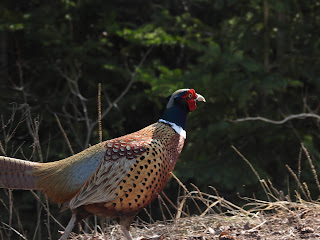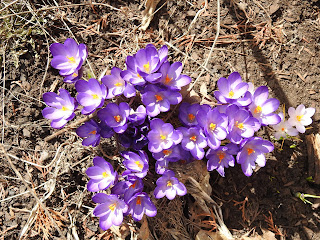NATURE MONCTON INFORMATION LINE, March
24, 2021 (Wednesday)
To respond by e-mail, please address
your message to the information line editor, nelsonpoirier435@gmail.com .
Please advise the editor at nelsonpoirier435@gmail.com if any
errors are noted in wording or photo labelling.
For more information on Nature Moncton, check the website at www.naturemoncton.com .
Edited by: Nelson Poirier nelsonpoirier435@gmail.com
Transcript by: Brian Stone bjpstone@gmail.com
Info Line # 506-384-6397 (384-NEWS)
** The New Brunswick Environmental
Network is sponsoring a webinar on “The Life and Times of Owls in New Brunswick”.
The announcement with a join in link is attached below in Clara Thaysen’s
message.
|
|
(Editor's note: Heckles and boos are to be held until the cameras go off!!)
--
** The COMMON GRACKLES [Quiscale
bronzé] and RED-WINGED BLACKBIRDS [Carouge à épaulettes] are starting to move
into urban areas. In the past days Jamie Burris had a photo of a Common Grackle
and a Red-winged Blackbird side by side in his Riverview yard among the 9 that
he had arrive on March 19th. Jamie also got a nice photo of a SNOW
BUNTING [Bruant des neiges] roadside in Sackville on Monday very much in its fluorescent
white breeding plumage and no doubt thoughts of a northern voyage soon.
** Gordon Rattray visited the SKUNK CABBAGE patch on Route 960 (Upper Cape) to get more photos of it doing it emerging during this short window of opportunity.
Gordon stopped at Pointe-du-Chene for a photo
of 4 BLACK SCOTERS [Macreuse noire]. One is an adult even with some colour in
the bill. In consult with Gilles Belliveau
He felt fairly certain that a
first year male would be more black by this point rather than having a female
type coloration. In looking at photos of females in the spring and reading on
Birds of the World, females can have yellow on the basal half of the bill providing
text from Birds of the World:
Bill
In male,
black, becoming orange-yellow on upper mandible from just in front of nostril
to the base, narrowly divided by black along middle of upper surface. Base of
upper mandible distinctly swollen (Miller 1926). In female, blackish with
hint of yellow in basal part of upper mandible but with very little or no
swollen area.
**
Yvette Richard got a photo of the International Space Station as it passed over
at 8:00 pm on March 20th. The first time that we have posted a photo
of its passing.
Yvette
also visited the pond beside the Bouctouche lagoon at feeding time with all
patrons seeming to heartily enjoy sharing offerings.
Yvette also photographed a male COMMON EIDER
[Eider à duvet] doing a takeoff roll at Cassie Cape.
**Grant and Magda Ramsey spotted a very cooperative
pair of BALD EAGLES up to the boardwalk by Bouctouche on Wednesday
morning. Note the significantly larger female of the pair on the left.
**Cynthia MacKenzie shares a few wildlife spottings around their Charles Lute’s Rd.
home.
A SNOWSHOE HARE
has been hanging out along their tree line. They have watched it multiple
times in the last couple days but it rarely is in the open for a good photo. It
is still sporting quite a lot of white pelage. They also had six WHITE-TAILED
DEER Tuesday night nearly able to get all six in one photo.
The RING-NECKED
PHEASANT still visits every morning and they also had a RED FOX stop by mid
morning last week. Another Red Fox bravely ran across the Ryan St. traffic
Monday morning between Kingswood and Northrop Frye Schools during the busy
morning drop off time (7:30-8:00).
** Georges Brun
reports that on successive dates a pair
of BALD EAGLES were breeding near the Bend of the Petitcodiac River. Not
sure but they may have their nest just north-east of Mac Wilmot property.
Georges comments the section of the Petitcodiac River
opposite the Irish Monument has plenty of ice on its banks! Even with no
ice the banks may be frozen up until September. The mud acts as an insulator
and when the banks slump you are able to see the frozen ice under the mud.
Yesterday, Georges
photographed a pair of Bald Eagles from the parking site on the south side of
the Cocagne Bridge. He assumed the immature that showed up was their
offspring.
A COMMON EIDER flock of approximately 125 was photographed from the
Trans-Aqua outlet and flew north east just pass the new apartment complex on
Acadie or Amirault across from Home Hardware and the Pharmacy.
At Shediac Bridge (single lane steel bridge) Georges photographed perhaps 50 COMMON
MERGANSER with 4 COMMON GOLDENEYE among the flock.
**
Daryl Doucet has had a cock RING-NECKED PHEASANT [Faisan de Colchide] strutting
through his urban yard asserting its spring authority.
Daryl also had a beautiful group of CROCUS
blooming in his yard. It will be very interesting to watch for the very early
bee species that will be visiting them for pollen as well as the possibility of
Honeybees from nearby hives.
**
Brian Stone photographed a few HONEYBEES [Abeille] going into a bird feeder and
seeming to stay for a while. I had a report a few years ago of dozens of Honeybees
similarly foraging on something in a sunflower seed feeder. There must be
something there that attracts them and I would wonder if it may not be remnant
pollen grains.
Brian also had his first EASTERN CHIPMUNK
[Tamia de l'Est] emerge from its winter spent underground. It appears to have
wintered well on its stored food supply.
Nelson
Poirier,
Nature
Moncton















